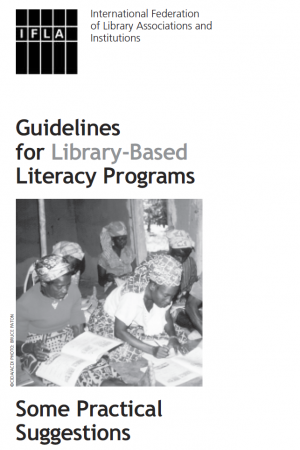ACTIONS
- Protect and safeguard cultural and natural heritage
- Learning and educational opportunities
- Cultural participation/social inclusion
- Sustainable tourism
- Support research
- Employment (recruiting, training, safety)
- Energy consumption, greenhouse gas emissions
- Waste management and reduction
- Transport (forms of, energy use)
- Commercial activities including copyright and IP
- Governance and management
- Security, disaster preparedness, risk reduction
- External partnerships and collaborations
- Toolkit/framework/roadmap
IFLA Guidelines for Library-based Literacy Programs: some practical suggestions
- International Federation of Library Associations and Institutions (IFLA)
“The IFLA Section on Literacy and Reading is pleased to present some practical suggestions for library staff who would like to help our society become more literate. We believe that libraries are uniquely situated to promote literacy. Libraries may develop and staff their own programs or they may support literacy projects sponsored by other organizations.
The aims of these practical pointers are:
To encourage libraries to become involved in literacy programs.
To serve as an informal checklist for evaluating library-based programs that are already in place.
Our definition of literacy is broad. It includes the development and practice of reading, writing, and numeracy skills (skills related to numbers). These skills encourage the independence, curiosity and lifelong learning of individuals and groups. Such learners contribute greatly to the economic, social and cultural health of the communities and the nations in which they live.”
Avaiable in
- Arabic
- English
- French
- German
- Russian
- Spanish
SDGs LINKAGES
The resource can help support SDG targets relating 4.4 (staff skills), 4.5 (removing barriers to education) and, especially, 4.6 (ensure that all youth and a substantial proportion of adults, both men and women, achieve literacy and numeracy), as well as 4.A (inclusive learning environments), 9.1 (sustainable and inclusive infrastructure), 10.2 (empower and promote universal social, economic and political inclusion) and 11.7 (safe, welcoming and inclusive public spaces). The focus on partnerships supports SDG 17.17.
Click on the SDG Target to discover Our Collections Matter indicators
-
Our Collections Matter indicators:
- Number of young people and adults in skills-development activities and programmes drawing on collections, for employment, decent jobs and entrepreneurship.
- Increase in number of young people and adults in such programmes.
- Number and proportion of staff who have received training in the last year, to better support their contribution to the SDGs.
- Programs and processes in place to ensure the availability of a skilled workforce.
-
Our Collections Matter indicators:
- Number of educational and/or training programmes drawing on collections directed to eliminate gender disparities in education.
- Number of educational and/or training programmes drawing on collections directed to meet the particular needs of persons with disabilities.
- Number of educational and/or training programmes drawing on collections directed to meet the particular needs of Indigenous peoples’ groups.
- Number of educational and/or training programmes drawing on collections directed to meet the particular needs of children in vulnerable situations.
-
Our Collections Matter indicators:
- Number of programmes drawing on collections to support literacy and numeracy among youth.
- Number of programmes drawing on collections to support literacy and numeracy among adults.
- Number of programmes drawing on collections to support literacy and numeracy among marginalized groups.
-
Our Collections Matter indicators:
- Number and proportion of education facilities that are child, disability and gender sensitive.
- Proportion of education facilities that provide safe, non-violent, inclusive and effective learning environments for all.
- Number and type of initiatives to improve effectiveness of learning environments.
- Support given to other education facilities to make them more inclusive and effective.
-
Our Collections Matter indicators:
- Development of research-useful collections to support reliable, sustainable and resilient use by researchers and others.
- Number and proportion of collections facilities and stores that support economic development and human well-being.
- Number and proportion of collections facilities and stores that provide affordable and equitable access for all.
- Investment in collections facilities.
- Inclusion of collections information in regional and transborder initiatives, notably via digital access for discoverability.
-
Our Collections Matter indicators:
- Collections development to ensure that collections effectively meet the needs of all, irrespective of age, sex, disability, race, ethnicity, origin, religion or economic or other status.
- Number and proportion of educational and participatory programmes that promote participation irrespective of social or other status.
- Numbers and proportions of people making use of collections in relation to the demographic of the local population.
- Numbers and proportions of people involved in focused programmes aimed at promoting social, economic and political inclusion.
- Numbers and proportions of people from different demographic groups involved in decision-making processes relating to collections and collections-based institutions.
- Number and types of partnerships that build relationships with marginalized groups, individuals and communities.
-
Our Collections Matter indicators:
- Numbers of people accessing collecting institutions from different demographic groups, notably women, children, older people and persons with disabilities.
- Increases in numbers of people accessing collecting institutions from different demographic groups.
- Measures taken to remove barriers to access green and public spaces.
- Extent of green space provided by collections institutions.
-
Our Collections Matter indicators:
- Amount of United States dollars committed to public-private and civil society partnerships.
- Number and/or increase in number, and diversity of local, national and regional multi-stakeholder (public, public-private and civil society) partnerships that address the SDGs drawing on collections, or that otherwise involve collections-based organisations and institutions.

